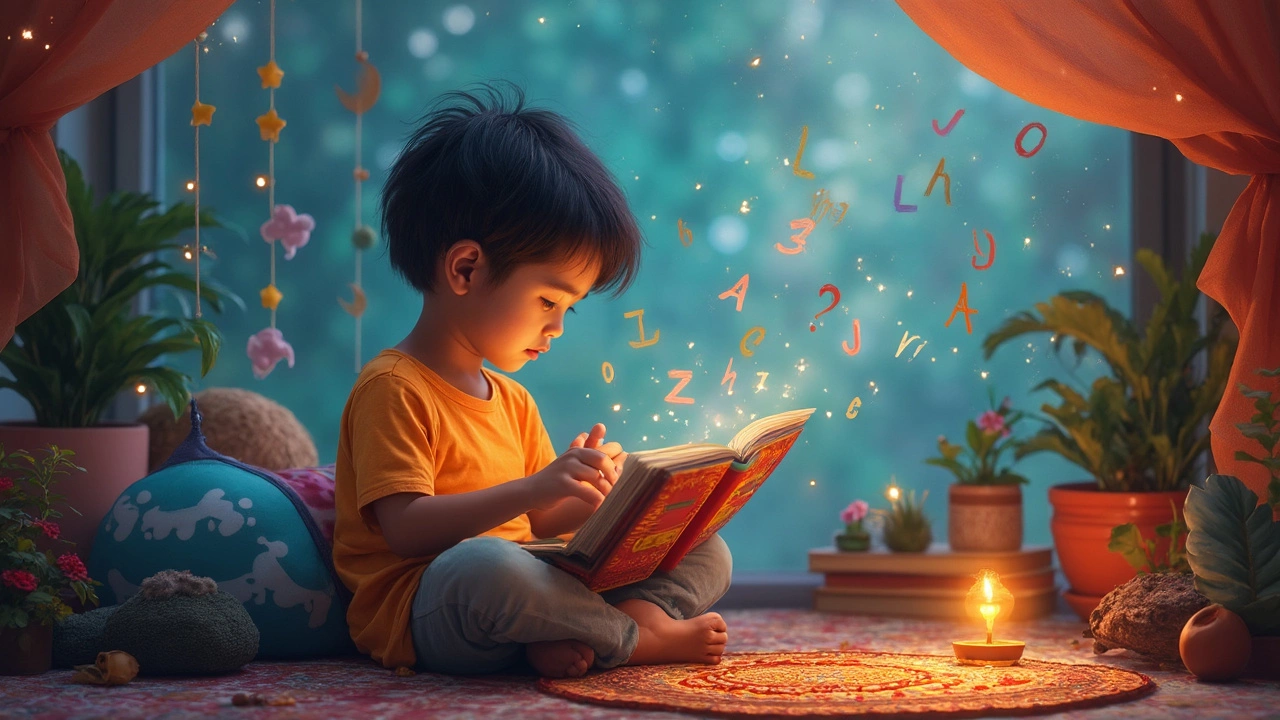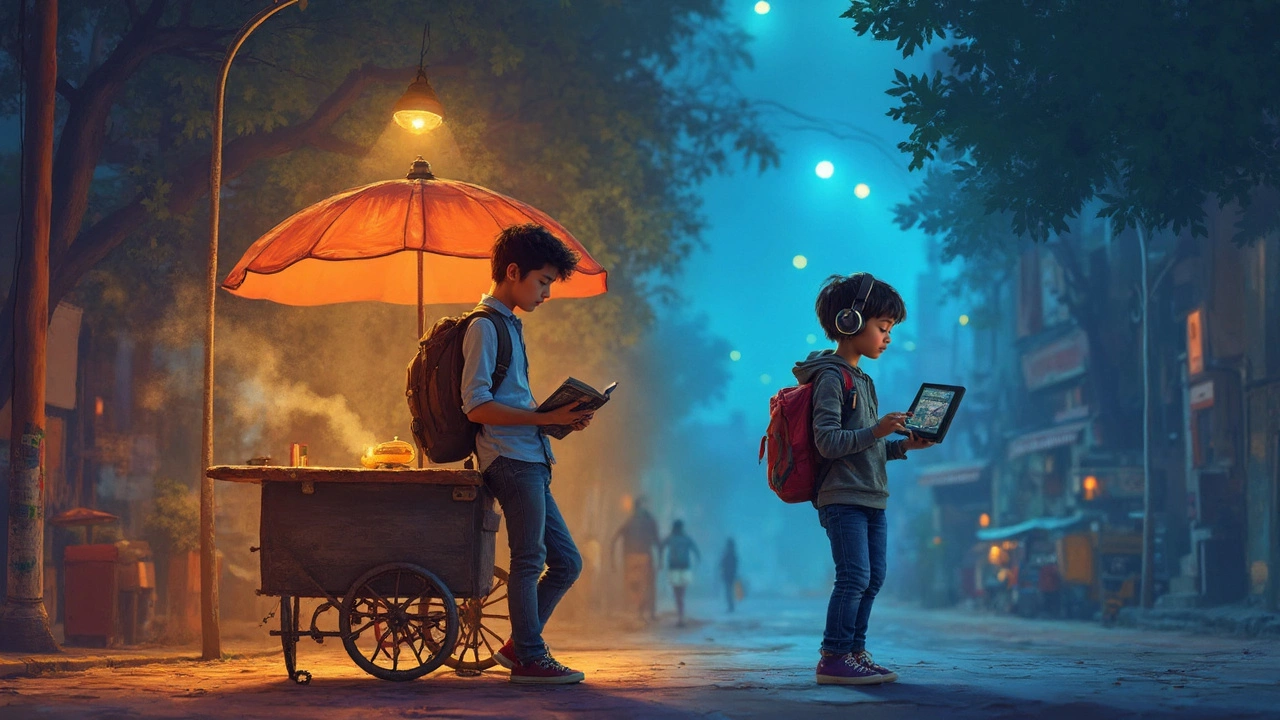So, you're curious about this whole Gen Z and Gen Alpha thing? Well, you're not alone. These two generations are shaking things up, especially when it comes to reading trends. Let's face it, their habits aren't just like any other. Born between the mid-90s and early 2010s, Gen Z grew up with the internet right at their fingertips. Meanwhile, their younger siblings, Gen Alpha, stepped into a world of smartphones and smart everything from the get-go. It's a tech wonderland! But what does this mean for their reading habits?
Here's the deal: technology has a huge say in what and how these generations read. For Gen Z, online platforms like TikTok, Instagram, and Twitter aren't just for memes and selfies. They're like modern-day libraries, offering bite-sized book recommendations and discussions. On the flip side, Gen Alpha is all about colorful, interactive apps that make reading fun and engaging. It's no wonder the old-school hardcover isn't their first pick.
But don’t count print out just yet! There's a twist: while you might think digital is all the rage, print is making a surprising comeback among these young readers. Whether it’s the tactile feel of a book or the idea of unplugging, there's something charming about physical books that's reeling them back in.
- Generational Divide: Who Are Gen Z and Gen Alpha?
- Impact of Technology on Reading Habits
- Cultural Influences and Literary Interests
- Understanding Digital vs. Print Preferences
- Tips for Engaging Gen Z and Gen Alpha Readers
Generational Divide: Who Are Gen Z and Gen Alpha?
Alright, so let's get into the nuts and bolts of who these folks are. First up is Gen Z. If you were born from the mid-90s till around 2010, congrats! You're a member of Gen Z. This generation came of age right when Wi-Fi became a thing in nearly every home. They’ve seen the evolution of social media platforms from the MySpace days (remember that?) to the Instagram and TikTok powerhouse.
Then there's Gen Alpha, the kiddos born from 2010 onwards. These are the youngsters whose first words might just be 'OK Google' or 'Hey Siri.' Growing up in an era where screens are as common as crayons, they are the first truly digital-native generation. Imagine having access to an iPad before your first day of school!
But that’s not all. The way they interact with the world varies, too. For Gen Z, social causes are huge. They’re the activists rallying for climate change, equality, and more. Gen Alpha? Too young to make big waves just yet, but they're soaking all this in, setting them up to be quite influential in the future. The exposure to digital platforms might mean they have even more avenues to express themselves than Gen Z had at their age.
Here's a quick snapshot:
| Generation | Birth Years | Main Characteristics |
|---|---|---|
| Gen Z | Mid-90s to 2010 | Tech-savvy, socially conscious, diverse |
| Gen Alpha | 2010 onwards | Digital natives, adaptive, engages with interactive media |
So, why does all this matter? Well, understanding these generational divides helps us cater to their unique needs—whether we're talking about designing apps, crafting books, or even developing marketing strategies. Knowing the differences means speaking their language, literally and figuratively.
Impact of Technology on Reading Habits
Ever noticed how tech has reshaped the way we do just about everything, reading included? If you look at Gen Z and Gen Alpha, you'll see a huge tech influence on their reading habits. These kids aren't just flipping through pages like the generations before them used to; they're diving headfirst into a digital world that gives them access to more content than ever.
For starters, Gen Z grew up during the rise of social media, which means they're all about sharing and discovering new books on platforms such as Instagram and TikTok. Have you seen #BookTok trending? It's not just a fad; it's how many Gen Zs choose their next read. They love quick, relatable reviews, and BookTok offers that splash of community and interactivity they crave.
Gen Alpha, on the other hand, is totally at home with interactive e-books and educational apps. They're often exposed to screens from an early age, so it's no surprise that apps with gamified reading experiences are super popular. These apps make storytelling more engaging and are often packed with vibrant visuals and interactive elements that keep the youngest readers hooked.
But wait, there's more to this shift. E-readers like Kindle have also skyrocketed in use because they let you carry entire libraries on the go. Physical space for books has become less of a concern when everything fits in your pocket. But interestingly, while digital books are great, research shows a blend of media often enhances comprehension and retention.
Despite all this tech influence, traditional book formats haven't vanished. In fact, there's a counter-trend—a surprising number of young folks still cherish the tangible magic of paper books. For some, there's a sense of nostalgia, even if it's retro nostalgia they never actually lived through. The paper smell, the physical turning of pages—these are still endearing to many.
This dynamic mix of digital and traditional formats is more than a phase; it's how they build personal preferences. As the digital boom continues, these generations are picking what's new and what's old in ways previous generations never really did. It's a unique balance they've struck, creating a rich and varied reading landscape.

Cultural Influences and Literary Interests
Culture is like the secret ingredient that makes the reading habits of Gen Z and Gen Alpha so unique and fascinating. If you're wondering why these kids pick up certain books or seem drawn to specific genres, the cultural influences in their lives hold the answers.
For Gen Z, their literary interests often reflect the social issues they care deeply about. Issues like climate change, gender equality, and diversity aren’t just buzzwords for them—they’re pivotal themes in the stories they choose. Books like "The Hate U Give" by Angie Thomas, which tackles racial injustice, or "Children of Blood and Bone" by Tomi Adeyemi, with its rich exploration of cultural identity, are prime examples of how literature meets their social consciousness.
On the flip side, Gen Alpha, though younger, shows a budding interest in stories that are both educational and entertaining. Picture books with engaging narratives and vibrant illustrations are a hit. Series like "The Bad Guys" or "Dog Man" captivate them with humor and action. They're also leaning towards stories that incorporate STEM themes, blending fun with learning.
Pop culture also plays a major role. With the influence of films, video games, and even comic books, both Gen Z and Gen Alpha often look for books that extend the stories they love on screen—and sometimes even shape those on-screen worlds. Consider the rise in popularity of graphic novels! Titles like "American Born Chinese" by Gene Luen Yang are hitting the spot, offering a relatable mix of culture and personal growth.
To connect with them, it's important to appreciate these cultural backdrops. Pay attention to the themes that resonate with them. Whether it's through diversity in stories or new storytelling formats like webcomics, both generations are constantly influenced by the world around them, and their bookshelves reflect this beautifully.
Understanding Digital vs. Print Preferences
Alright, let's talk about what gets Gen Z and Gen Alpha excited—digital or print books. Spoiler alert: both have their fans. Thanks to the digital world, reading has gotten a high-tech twist. E-books and apps are super popular, mainly because they can be accessed anytime, anywhere. I mean, who doesn't love the idea of carrying an entire library in the back pocket, right?
Now, here's an interesting tidbit: about 67% of Gen Z readers say they enjoy e-books, appreciating how easy it is to get them instantly. Meanwhile, 75% of Gen Alpha kids have used an educational app that helps them develop reading skills. Apps with colorful animations and interactive elements keep the little ones hooked, bringing stories to life in ways plain old paper can't.
But hey, don't write off those traditional books just yet! Even in our tech-savvy age, there's something about flipping through real pages that grips young readers. Recent surveys say over 60% of Gen Z still buy physical books, often for the aesthetic, mood, and sometimes just to take those cool Instagram shots.
The charm of print lies in its simplicity—no notifications or distractions, just you and the story. Plus, print books are great for reducing screen time, something parents of Gen Alpha are highly mindful of. Not to mention, the tactile experience of a book—the weight, the smell of paper—is unmatched by a touchscreen swipe.
In a nutshell, there's room for both digital and print in these generations' hearts. The key is variety and preference, allowing them to explore both worlds depending on mood and situation. Plus, as technology evolves, who knows what exciting new format might pop up to mesmerize these young readers next?

Tips for Engaging Gen Z and Gen Alpha Readers
Diving into the world of Gen Z and Gen Alpha can feel like stepping into a new universe. They have their own unique quirks and preferences. But don't worry; we've got some ace tips to help you connect with these savvy young readers.
First off, how about meeting them where they are? If you're looking to hook Gen Z, consider using social media platforms. TikTok and Instagram are their playgrounds. Think short, snappy book reviews or enticing cover reveals. The visual appeal is key, so make sure your content pops on these visual-heavy apps.
For Gen Alpha, interactive content is a winner. They're growing up with touchscreens, so why not use apps that make reading an adventure? Bright, engaging graphics and simple interactive elements can make all the difference. Consider apps that mix storytelling with games to capture their attention.
Another cool approach is to embrace inclusivity and diversity. Both these generations are hugely diverse and expect to see themselves in the stories they read. Highlight diverse characters and cultures in your content. It's not just about being trendy; it's about being authentic and relatable.
Don't forget about print, though! There's a sweet spot for introducing physical books to these kids. Consider special editions or series that encourage collecting. Some Gen Zs appreciate paperback and hardcovers as unique personal treasures, especially when digital overload kicks in.
- Leverage Social Media: Use TikTok for book challenges; post eye-catching Instagram stories.
- Create Interactive Content: Use apps that make reading a fun experience.
- Highlight Diversity: Be inclusive in your content, reflecting different cultures, backgrounds, and identities.
- Revive Print: Present physical books as collector's items or nostalgic escapes.
By focusing on these strategies, you'll be able to grab the attention of both Gen Z and Gen Alpha and turn them into lifelong readers.

